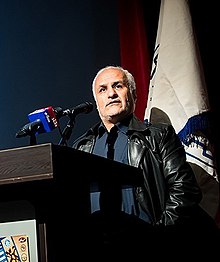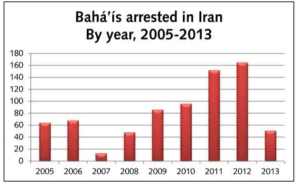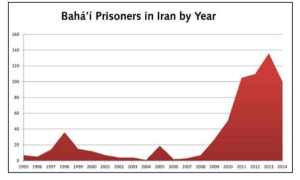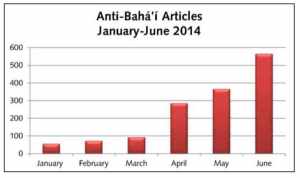
Iran Wire, March 3
In a speech to seminary students and teachers, Ayatollah Mesbah Yazdi, an influential hardliner in the Iranian regime, stated “Some have come forward with a plan for citizenship rights and want to give equal rights to the Bahais and the Jews and the Muslims and… We can never accept this.” There was no doubt that he was referring to the Draft Citizenship Rights Charter presented by Rouhani’s administration last November.
Yazdi’s ire was directed at the principle that all citizens are equal under the law. “All Iranian citizens, regardless of their gender, ethnicity, wealth, social class, race, etc, enjoy citizenship rights and the foreseen guarantees in rules and regulations,” declares the draft charter’s first article. The sentence does not include the term “religion,” probably intentionally, but the “etc.” leaves a lot of room for speculation. Hardliners have been quick to speculate, especially when it comes to the Bahai community, which has been harassed relentlessly since the Islamic Revolution.
“The standard is always Islam,” Yazdi told the theological school students. “Western human rights and citizenship rights, meaning equality between Muslims and Bahais, has no relation to Islam. These rights, as described by the West, utterly go against Islam, the constitution and the way of Imam [Ayatollah Khomeini]. The people of this country, who have suffered hardships and have given so many martyrs, would not accept anything that goes against Islam. Of course, even those who are not Muslims must be respected. They have rights, which Islam recognizes.”
Second-Class Citizenship
Ayatollah Yazdi says that religious inequality is acceptable. “Islam never considers a Jew and a Muslim as equals,” he said. “Even though Islam has conferred certain rights to Jews, this does not mean that they are equals in every right. Sometimes this is called ‘second-class citizenship’. They can call it whatever they want, but it does not change the reality.”
Here, Bahais are conspicuous by their absence. Whereas in pronouncements condemning “equality,” Bahais were included [if only to be excluded ~Sen], when it came to “rights” they were not mentioned – not as second-class citizens, not even as third-class citizens. Not at all.
Human rights activists and liberal commentators have been critical of the rights charter for a number of reasons, labeling it “elegant but useless” and a “hodgepodge of things,” but Yazdi sees the charter as anti-Islamic both in word and in spirit.
The spirit, of course, comes from the people who wrote the draft under orders from Rouhani. Addressing the students, Yazdi asserted that those who promote citizenship rights are wrong about Islam and wrong about the history of the Islamic Republic. When citizenship rights supporters cite Ayatollah Khomeini’s respect for democratic practices such as the right to vote, they are misconstruing his words. They believe Khomeini “was a political figure and a national hero who opposed the previous regime because it was harmful for the country and wanted to establish a system which would be more beneficial to people.” But, according to Yazdi, this is simply untrue. “People who think like this are secular and, in their view, good and evil consist of material things,” he said, adding that, for these people, “evil is material backwardness and the absence of well-being, while good is using technology and providing a good life for everybody. They believe religion is something marginal, a fantasy.”
Islam was absolutely central to Khomeini’s thinking, Yazdi said. “When he said that society was facing a great danger, he meant a great danger for Islam. This was something that was not important to many politicians.”
Are the people who want equal rights for all citizens enemies of Islam? asked one student. “They are not really enemies of Islam,” he answered, “but this is how they see the world, especially if the person is educated in England or some other place like that, because in those places they talk of human rights, citizenship rights and other rights with such reverence that gradually the student comes to consider them as the most important issue.” He added that, although he was 80 years old, it would still be possible for him to fall under the influence of Western rhetoric if he travelled to one of these countries. So it was logical to assume a “young person who has no deep understanding of Islamic principles” to be particularly vulnerable to influence.
Full report
Persian report
Contrasting views of Ayatollah Masumi Tehrani
Short link: http://wp.me/pNMoJ-1XB
Older items can be found in the archive, here. Even older news is here.
 Mr. Abbassi an an Islamic Revolutionary Guard Corps officer and head of a think-tank affiliated with the Guards. He has been described as the big strategic brain for the ruling elite, which is quite plausible. He is best known outside Iran for his conspiracy theories, including antisemitic conspiracy theories. Two of the sites mentioning his speech are
Mr. Abbassi an an Islamic Revolutionary Guard Corps officer and head of a think-tank affiliated with the Guards. He has been described as the big strategic brain for the ruling elite, which is quite plausible. He is best known outside Iran for his conspiracy theories, including antisemitic conspiracy theories. Two of the sites mentioning his speech are 












 June 14.
June 14. 






 Editorial
Editorial
Covid-19 & the missing masks of Iran
Tags: anti-Bahaism, Bahai Faith, Iran, Sen McGlinn, سن مک گلین
Editorial, February 26, 2020. –
I won’t try to cover the spread of the Covid-19 virus in Iran: it needs a daily review and there are other media doing that. However I note that the BBC has reported a shortage of masks in Iran. Face masks are not effective in protecting the wearer, but that’s not the point. Masks are what people want, and if there are not enough to go round, what will the regime do?
They will blame the Bahais. Government-sponsored media (in Persian) are relaying a story that a ring of Bahai mask-hoarders has been uncovered and broken up. See the story here, and here and here.
The problem for the regime is: now they have reported the seizure of all the masks that Bahais were hoarding, how will they explain that there are still no masks to be had? Those Iranians who believe the story of Bahai mask hoards in the first place will have to conclude that now the security forces are hoarding the seized hoards …
It’s a tough life, being a totalitarian regime and thick as two bricks at the same time.
The actual causes of the shortage include lack of foresight — but then, who saw Covid-19 coming? — and sanctions which do not stop medical imports but do limit the funds available and the means of transferring money, and the general evils of a centrally-planned economy run by the least capable.
Share this: